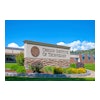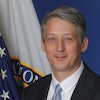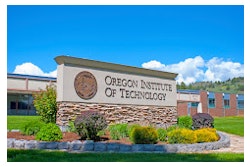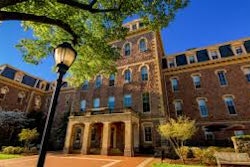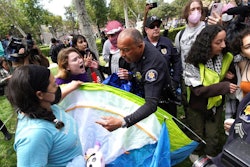Matters of freedom of expression and higher education’s federal responsibilities were at the forefront of the University of California’s Sixth Annual #SpeechMatters Conference. 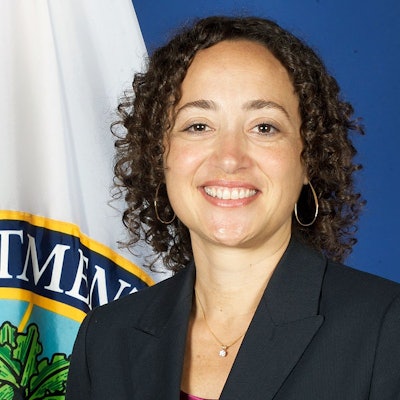 Catherine Lhamon
Catherine Lhamon
The virtual half-day conference, held April 18, brought together panelists from across higher ed – including federal officials, faculty, staff, university deans, and students – to speak about the state of free speech on American college campuses, particularly amid ongoing tensions regarding the Israel-Palestine conflict and the 2024 elections.
“Across the country, we are confronted with the challenges of extreme polarization, perhaps no more intensely than on our college campuses,” said UC President Dr. Michael Drake. “Places that ideally offer space for exchanging ideas and stretching perspectives, institutions of higher education are increasingly charged environments.”
Hamas’s attack on Israel last October is one of the latest assaults in a bloody decades-long geopolitical dispute. Tensions surrounding this most recent conflict – which has resulted in thousands of deaths, mostly of those in Palestine – have flared student protests and hostility at colleges.
Last December, Congress questioned the presidents of several high-profile universities about potential antisemitism on their campuses. As recently as April 17, Congress called on Columbia University President Dr. Nemat Shafik to answer about reports of antisemitism and harassment of pro-Palestinian students.
Universities have a federal civil rights obligation under Title VI of the Civil Rights Act of 1964 to take action if they know or should have known about the presence of hostile environments on their campuses, including those against Jewish and Palestinian students, Catherine Lhamon, assistant secretary for civil rights at the Department of Education (ED), said in a recorded message during the conference.
There has been a “proliferation of hate” in campus communities in recent months, she said.
“My office generally finds that a hostile environment exists where there is unwelcome race/national origin-based conduct that, based on the totally of circumstances, is subjectively and objectively offensive and is so severe or pervasive that it limits or denies a person's ability to participate in or benefit from the recipient's education program or activity,” Lhamon defined.
Even if schools find that certain speech is protected, they still have a responsibility to ensure that it doesn’t create hostile environments for students, she said.
And colleges can act in ways that do not necessarily cause conflict between free speech rights and their obligations against discrimination, such as publicly rejecting derogatory opinions, providing counseling to affected students, instructing students on how to file discrimination complaints, and teaching students how to engage in civil discourse, Lhamon said.
Students’ knowledge about Title VI and freedom of expression may vary, depending on their access to resources and people who can help them understand, explained Dr. Sheri Atkinson, associate vice chancellor for student life, campus community, and retention services at UC Davis. To that end, her office focuses on giving students proactive education about their rights and existing policies.
 Dr. Sheri Atkinson
Dr. Sheri Atkinson
But students are not the only party that can be victim to harassment. Multiple faculty and staff speakers told their stories of being targeted for their work. This kind of harassment – such as emails, social media, and death threats – is pervasive and can lead to censorship of faculty work, the panelists said.
It can be thoroughly isolating, added Dr. Patrick Grzanka, divisional dean for social sciences at the University of Tennessee, Knoxville, after sharing his own story of targeted harassment.
“It's really important to understand that we're talking about a structural form of isolation that this kind of harassment involves,” Grzanka shared. “It isolates you within your job, within your expertise, within all of your professional roles. It can make people incapable of doing their work. If what you're being harassed for is simply existing in your role, the stress ... can be quite debilitating.”
Often in discussions about free speech, the First Amendment and a desire for a “marketplace of ideas” are brought up. But such ideas are not foolproof, said Dr. Mary Anne Franks, the Eugene L. and Barbara A. Bernard Professor at George Washington University’s Law School.
“Sometimes, when we think about the marketplace of ideas, we don't think enough about how unfortunately it is very much like a marketplace in a bad sense,” Franks noted. “There are people with more power and more resources who are able to keep other people out. If you have [a] lack of safeguards, certain things can poison the marketplace, hurt people, and damage the things that people are looking for.”
As the U.S. approaches its 2024 election season, student voter participation was centered during one of the conference’s panels. Today’s students are interested and concerned about several issues – the economy, civil and reproductive rights, climate change, etc. – but they are at the same time quite disengaged and disillusion with the current state of politics, according to the panelists.
Students are exhibiting signs of hopelessness and feeling as though they are not being listened to by their representatives in a dysfunctional government, said Dr. Nancy Thomas, executive director of the AAC&U’s Institute for Democracy & Higher Education.
“We know from the polls that our elected officials are not listening to us,” Thomas said. “We know that most Americans want reasonable gun safety [and] reproductive rights for women. And yet, they are not following through on the will of the people.”

